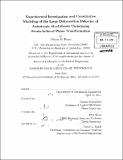Experimental investigation and constitutive modeling of the large deformation behavior of anisotropic steel sheets undergoing strain-induced phase transformation
Author(s)
Beese, Allison M
DownloadFull printable version (13.67Mb)
Other Contributors
Massachusetts Institute of Technology. Dept. of Mechanical Engineering.
Advisor
Tomasz Wierzbicki and Dirk Mohr.
Terms of use
Metadata
Show full item recordAbstract
The strain-induced phase transformation from austenite to martensite is responsible for the high strength and ductility of TRansformation-Induced Plasticity (TRIP)- assisted steels. The large deformation behavior of conventional steels is governed by crystallographic slip. In the case of TRIP steels, the phase transformation provides an additional microstructural deformation mechanism, which has a particularly strong effect on the strain hardening response at the macroscopic level. This thesis work develops a new plasticity model for TRIP steels that accounts for the effect of phase transformation. In particular, the large deformation behavior of 1.5mm thick stainless steel 301LN sheets at room temperature is studied in detail. Several techniques for quantifying the martensite volume fraction are evaluated including micrography, X-ray diffraction, neutron diffraction, magnetic saturation, and magnetic permeability measurements. The latter is then used to measure the evolution of the martensite content throughout mechanical experiments. The experimental program for different stress states includes experiments for uniaxial tension, uniaxial compression, equi-biaxial tension, pure shear, and transverse plane strain tension. The resulting experimental data demonstrate the influence of both the stress triaxiality and Lode angle parameter on the austenite-to-martensite transformation kinetics. A stress-state dependent transformation kinetics evolution equation is proposed which describes the martensite content as a function of plastic strain, the stress triaxiality, and the Lode angle parameter. Furthermore, a phenomenological plasticity model is developed comprising an anisotropic yield function, an isotropic hardening law, and a nonlinear kinematic hardening law with initial back stress. The isotropic hardening law expresses the increase in deformation resistances as a function of the plastic strain and the martensite content and is directly coupled with the stress-state dependent transformation kinetics equation. As a result, the model is able to describe the experimentally observed effect of stress state on the macroscopic hardening response. The constitutive model is implemented into a finite element program and used to simulate all experiments performed. The model predictions agree well with the experimental results for a wide range of stress states and for both specimens with homogeneous and heterogeneous stress and strain fields.
Description
Thesis (Ph. D.)--Massachusetts Institute of Technology, Dept. of Mechanical Engineering, 2011. Cataloged from PDF version of thesis. Includes bibliographical references (p. 139-146).
Date issued
2011Department
Massachusetts Institute of Technology. Department of Mechanical EngineeringPublisher
Massachusetts Institute of Technology
Keywords
Mechanical Engineering.